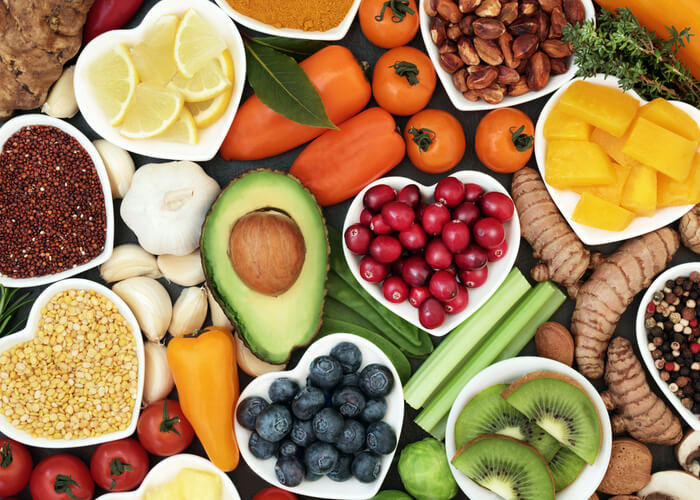Did you know your brain uses around 20 percent of the calories you consume every day? What you eat can have an impact on how your brain functions and how much your memory cells could be stimulated!
Certain foods not only support your brain functions and resist age related cognitive decline, but also enhance your memory power. Following a brain-boosting diet helps you to recall things faster and with greater clarity.
It’s always a good idea to include healthy foods in your diet that would sharpen your mental acuity. If you think a bowl of broccoli or a snack of walnuts is not helping you remember where you left your wallet or keys, it’s best to invest in one of those smart Bluetooth trackers or key finders rather than those memory capsules! A bottle of capsules could never match the fun of consuming a dark chocolate or a tall glass of turmeric latte!
Eating a selection of food that’s healthy for your body and brain is what will work in the longer run. Read on to know about the list of foods to improve memory, cognitive function and alertness.
- Fatty Fish
Fatty fish is at the top of the majority of lists discussing the best brain food. Fatty fish includes many of the superstars of the seafood world: salmon, sardines, trout, mackerel, anchovies (we can thank the Ninja Turtles for the popularity of this one). The reason fatty fish is so high on the list of good brain foods is that they are the absolute best source of omega-3 fatty acids.
Around 60% of the human brain is composed of fat, and half of all that fatty tissue is made of omega-3s. The brain utilizes omega-3s to produce nerve and brain cells, which makes these fatty acids completely essential for learning and memory. A study found that participants who ate fatty fish regularly had more gray matter in their brains, and gray matter is the tissue that contains the majority of neuronal cell bodies.
They not only help to improve your memory, they also preserve the memory abilities you already have. Omega-3 fatty acids have been proven to slow down cognitive decline that is brought about by age related diseases like Alzheimer’s disease. And a lack of omega-3 fatty acids can make learning very difficult because it can lead to depression or other learning impairments.
- Coffee
Coffee is one of those foods that is considered to be controversial, as in researchers cannot seem to make up their mind if coffee is healthy for you, and if it is, how much is too much. But generally speaking, we know that caffeine, the active ingredient in coffee does have some positive benefits on your brain.
Caffeine helps your brain in several ways:
- Increases alertness – It’s hard to remember anything if you’re not paying attention. Caffeine blocks adenosine, the chemical responsible for making you feel sleepy.
- Improves mood – Caffeine can stimulate the “feel-good” neurotransmitters that are in your brain like serotonin so that you can be in the proper mindset to absorb information.
- Sharpens concentration – The better a person is able to concentrate, the better they are able to absorb and retain information.
- Blueberries
One of the important things to remember when trying to improve your ability to memorize things is your brain’s functionalities are holistically connected. This means that all aspects of your brain affect the other. That’s where blueberries come in. They keep your brain healthy so that it can function at optimal capacity.
Blueberries have antioxidants known as anthocyanins, which are responsible for killing off free radicals that can cause oxidative stress which can cause the brain to age or deteriorate over time. Some of the antioxidants contained in blueberries also play a role in improving communication between brain cells. This further improves your brain’s optimization improving the memory.
- Turmeric
When it comes to your brain, you can’t go wrong with turmeric. This iconic yellow spice is one of the wonders of the health food world. Its active ingredient, curcumin has the very special ability to cross through the blood-brain barrier. This means that it can enter the brain and its cells directly, making it one of the most effective compounds for affecting brain health.
Curcumin is an extremely powerful antioxidant, right up there with blueberries (one of the best antioxidant sources), which is why it has such a powerful effect on brain health. It has been proven to enhance memory by clearing away amyloid plaques. They are a major feature of neurological degenerative diseases like Alzheimer’s disease.
The antioxidant also reduces depression by boosting serotonin and dopamine levels. One study found that regularly consuming curcumin could drastically improve symptoms of depression in a way equivalent to taking antidepressants for six weeks.
- Broccoli
If you’re raising an eyebrow at this entry to the list, then you will be surprised at how broccoli improves brain function. Broccoli is not normally toted as brain food. But that is a common misconception. This little green wonder is a major source of vitamin K, a rather necessary vitamin for a healthy brain. A single serving of broccoli has more than 100% of the recommended daily serving of vitamin K.
Vitamin K is necessary for forming sphingolipids, a densely packed type of fat that is part of the composition of brain cells. This is one of the reasons that vitamin K has been connected in improved memory in studies. Besides the vitamin K, broccoli also contains some great antioxidants which play a role in preventing inflammation among other issues. Include broccoliin your diet every day and find out if you are getting better at those memory tests! Sauté blanched broccoli in butter along with pepper and salt, store it in an insulated casserole, and you are all set for a healthy dinner loaded with vitamin K!
- Dark Chocolate
Sometimes you want to enhance your memory and improve your cognitive abilities, but you don’t want to eat something bland like broccoli. It can be tough, because the majority of healthy food doesn’t have a lot of sugar in it; this can be problematic for anyone nursing a sweet tooth. Thankfully, dark chocolate is actually a top-notch brain food. It has several compounds that do wonders for your brain: caffeine, flavonoids, and antioxidants.
The antioxidants kill free radicals that cause oxidative stress and inflammation and the caffeine improves awareness. The flavonoids are technically a type of antioxidant, but they’re so spectacular they deserve their own classification. They actually gather in the areas of the brain that are concerned with learning and memory and keep them functioning properly. They do this so effectively that multiple studies have found that participants who eat dark chocolate regularly often outperform non chocolate eaters in tests. That’s right, you now have an excuse for eating chocolate outside of dessert, and you’re welcome.
- Nuts
Generally speaking, nuts are some of the best things that you can eat for your overall health. They have everything you could want in a bite sized snack, including dietary fiber, protein, and carbohydrates. They also have healthy fats, antioxidants, and vitamin E, three compounds necessary to guarantee brain health. Vitamin E in particular helps to slow down age related mental decline by helping to protect cell membranes from receiving free radical damage.
Just about all nuts are good for your brain to a certain extent, but like in all things, some nuts are better than others. The best nuts to eat for your brain health are walnuts, since they have the highest omega-3 fatty acid concentration.
- Eggs
Eggs are some of the best brain foods you can ask for. They are also some of the best sources of protein as well as great sources of B complex vitamins, folate, and choline. You don’t want to underestimate the importance of these two essential vitamins.
The human body utilizes choline to create acetylcholine, a type of neurotransmitter responsible for regulating mood and memory. Studies have found that the more choline a person has in their body, the better their overall memory and mental functionality is. The majority of people do not meet the recommended daily intake of choline, however.
Folate plays a role in minimizing age related cognitive decline. It helps to synthesize brain chemicals and regulate the brain’s sugar levels at the same time which keeps your brain functioning at optimal levels.
- Oranges, Mangoes, and Bell Peppers
You might be wondering what all these foods have in common and how they can help to improve your memory. The answer is that they have lots and lots of vitamin C. Bell peppers actually have more vitamin C than oranges and mangoes combined. Vitamin C is basically the ultimate antioxidant, and it plays a pretty big role in maintaining our daily health. As an antioxidant compound, vitamin C helps to fight oxidative stress caused by free radicals which can cause your brain to age prematurely or your brain cells to become damaged.
You can find vitamin C in most fruits and vegetables, but some good options are:
- Guava
- Tomatoes
- Strawberries
- Blueberries
- Kiwi
Combine all these fruits in a nice salad, and make your own bowl of brain-boosting fruit treat!
Just like coffee, one of the reasons most people drink tea is for the caffeine. Caffeine has been proven to improve brains’ functionality by boosting alertness, focus, performance, and of course, memory. But green tea isn’t some one hit wonder, it is a true all-rounder when it comes to brain health. It also contains L-theanine, a type of amino acid that can cross the blood-brain barrier and consequently increase the activity of the neurotransmitter, GABA. The transmitter helps to regulate anxiety and stress; making it more active will help you feel more relaxed and put you in a better frame of mind to remember things. L-theanine does such a good job at helping you to relax, it can even reverse some of the effects of caffeine. Now, who wouldn’t want to relax over a cup of green tea?
- Soy Products
Yes, you knew it was going to show up on this list eventually. Soy is just one of those foods that finds a place on just about every health and wellness list. It just has too many positive benefits for the human body. When it comes to brain health, it has the ability to trigger certain neurotransmitters that are associated with memory thanks to its protein content.
The best thing about soy products is that you don’t have to work very hard to include them in your meals. You can simply replace your normal milk with soymilk and it’ll immediately start doing wonders for your memory. You can also include tofu in your salad or even start eating soy burgers. Although tofu doesn’t great taste on its own, there are recipes you can actually include tofu and enjoy!
- Tomatoes
Tomatoes and all tomato related products are top notch brain foods. They are rich in lycopene, a powerful antioxidant that protects the cells against free radical damage that has been linked to memory loss. The beautiful thing about tomatoes though is that you can so easily include them in your diet. Whether its drinking a simple glass of tomato juice in the morning, or eating ketchup with your fries, you can constantly be improving your memory retention abilities while eating all types of delicious tomato foodstuffs. This means that maybe you don’t need to lay off as much of the pasta as you may have previously thought – just make sure the sauce is tomato based.
There are lots of dietary options for keeping your brain healthy and up to snuff. It is important to remember, however, that there is no one perfect option. There is also no one size fits all option that suits everybody. If you are serious about enhancing your memory and protecting your brain, you have to take a completely holistic approach to brain health. That means you have to take care of your body via exercise and a proper diet. Your body houses your brain and your brain is designed to interact with your body in ways researchers still do not fully comprehend.
The first step to improving your brain health should be to make sure that you have a balanced diet and are receiving the appropriate amount of physical exercise. Then you should begin incorporating more and more brain foods from this list into your diet. Even then make sure you are eating these foods in a healthy and balanced manner. See your doctor if you have any questions, as they can tailor your diet to suit your particular needs.








Recent Comments